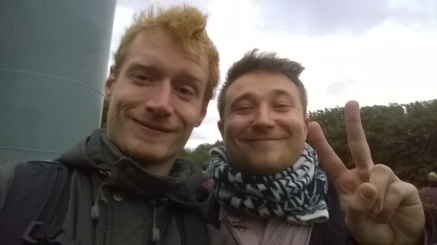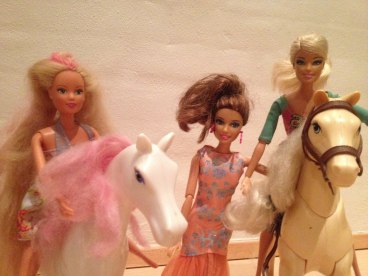I am afraid that the topic of this entry will be kind of peripheral to the main themes of this blog, but it’s a good story anyway, and it’s all about spreading good vibes, and love, and all the other stuff we like to pass around. So here we go. Good vibes. Almost as good as ice cream, and you don’t get less of it for yourself, when you share it with others. In that respect, even better, I guess. Moreover, it’s not bad for your teeth either… I’m digressing already. Let’s get on with it.
When I’m not blogging about being a volunteer at Taldansk, or actually volunteering, I spend some of my time recruiting new volunteers who would like to be part of the Taldansk family, and help someone practice the tongue twisting Danish language. Mathias (the dude on the right in the picture below) is my partner in crime, when we are recruiting volunteers, and a couple of weeks ago he had a great idea. There was this demo in Copenhagen and he suggested that we went to hand out some flyers and try to recruit some new faces. Although we are pretty apolitical in Taldansk, we simply could not let this chance pass us by.
The slogan of the demo was “refugees are welcome”, and we thought that we might be able to meet a lot of people who would be sympathetic towards the Taldansk Online project. We were spot on.
For some reason we look a bit stoned in this picture, I assure you that we are not.
We met up at the location of the demo, armed to the teeth with flyers and sales pitches, and within an hour we were completely disarmed in every way. Almost all the flyers were gone and exchanged for almost just as many curious questions, compliments and pats on the back appreciating the project and thanking us for our effort.
And that is pretty much why I wanted to share this story. It was a great feeling and quite surprising that so many people were genuinely interested and thought that Taldansk Online was a great initiative, and I thought to myself that I would try to pass that feeling on, if I could. So there you go. On behalf of all the people Mathias and I talked to at the demo, we would like to say, that you are doing a great job all of you. The ones of you who are volunteering at Taldansk Online are doing a great job helping people to a better, and, hopefully, a little easier start in Denmark, and the ones of you who are supplementing your language courses with online small talk are doing a great job acquiring the language skills necessary for getting by in a new country. Great job all of us! Pat yourself on the back.
I would like to have finished off this entry by telling about the host of new volunteers our flyers had secured us, but I would be lying if I did. We are making progress though, and all the goodwill we received that day almost made it worth the effort. And that’s the important part. Remember to let people know when you appreciate what they are doing. Compliments never get old.
Stefan


